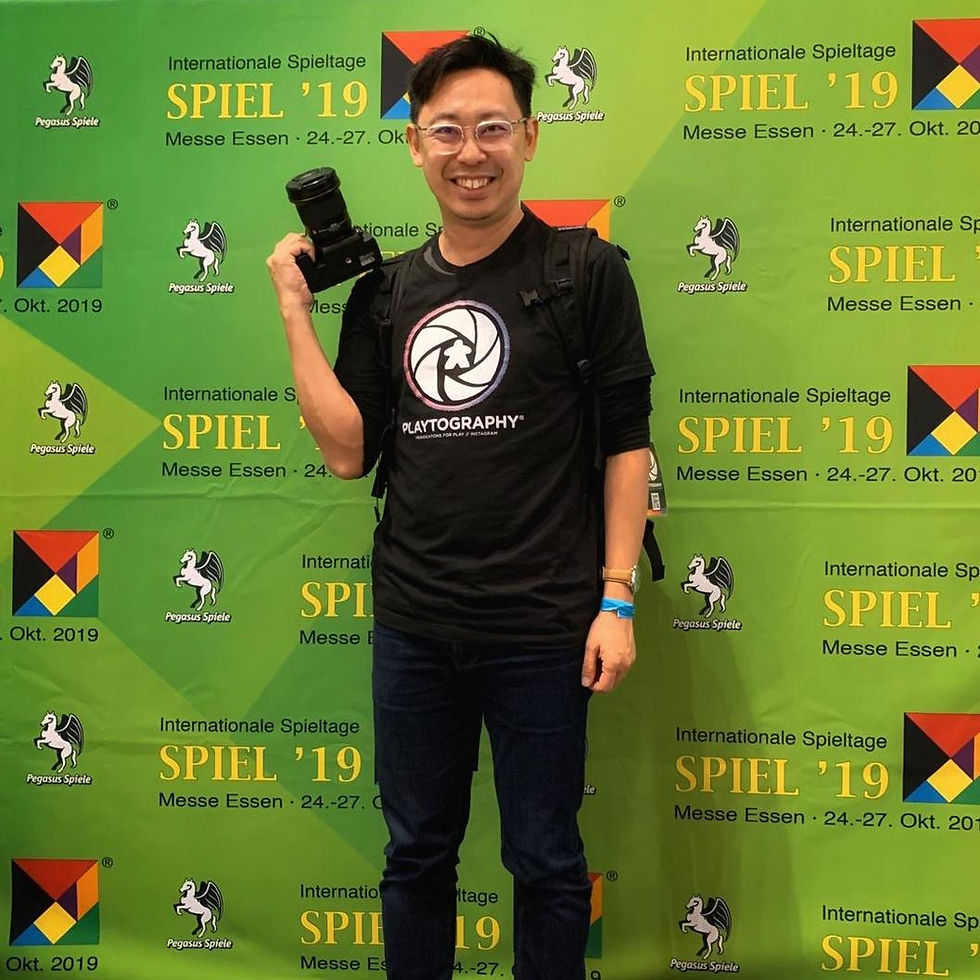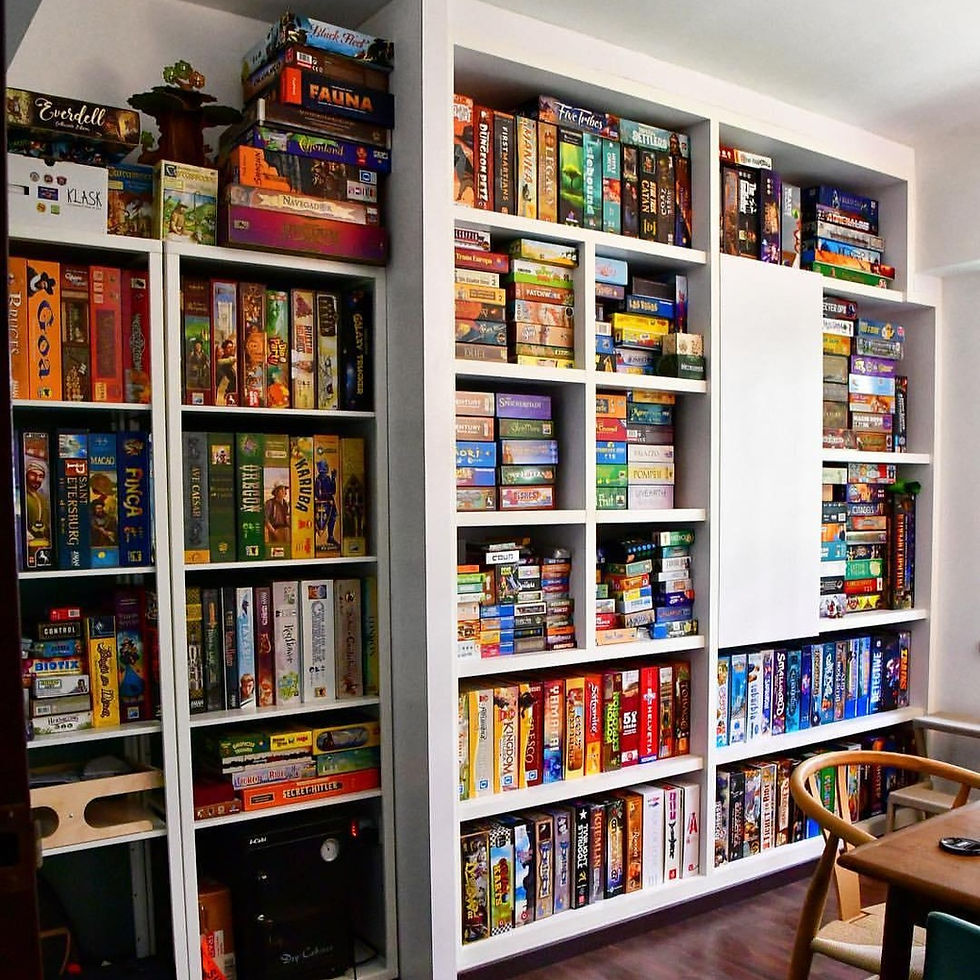Origin Stories: @playtography
- Nick Pang
- Nov 28, 2019
- 6 min read
Updated: May 23, 2022
Intellectually, we get it. Board games are cultural artifacts that not only express the social and cultural milieu of our times, they also serve the crucial function of fostering community and preserving civilisation. But for the vast majority who have never even heard of Catan, board games are seen as just overpriced pieces of cardboard and wood. That's where board game stylists come into play. Armed with camera, copy, and social media, they elevate board games into works of art, making them accessible to whole new populations. Among this special breed, one of the more recognised board game stylists is @playtography. We logged off for a chat to get to know the man behind the handle - Leonard Koh.
Hi Leonard, thanks for stepping into focus. I love your photos man. And although I've been following your account for a while now, it's only been very recent that I've gotten to meet the man behind those photos. I'm curious, how did you get started with Playtography?
Well, about six years ago, after I was bitten by the board game bug, I became very passionate about introducing people to the hobby. But board gaming has a less than stellar rep in Singapore, with Monopoly and Scrabble being the typical games that most people associate with the hobby. So I started searching for a way to open up people’s minds to the wealth of board games that are actually out there.

At my previous work at an ad agency, I was involved in some food styling work for the launch of a new meal replacement product that was coming into the local market. The key strategy was to present the products in irresistible and delicious ways in order to entice new customers to try them.

It occurred to me that perhaps I could do the same for board games! Thus, the concept of “food photography for board games” took root in my mind. So instead of being that ‘crazy board game guy’ who cannot stop talking about board games, I would style and capture games in flattering ways and let the images do the talking for me.
Instagram was the natural choice for a platform. When I began, I was pleasantly surprised to find an incredibly responsive and supportive board gaming community that was already active on Instagram. Their encouragement and the burgeoning interest of various publishers for me to showcase their games created the perfect opportunity for me to combine my work experience, interest in photography, and passion for board games in @playtography.
What's the inspiration behind the name Playtography?
Interestingly it came to me one day while sitting in the prayer room of my church. I remembered trying a couple of handles at that point, but none stuck.
I wanted a name that could simultaneously incite curiosity and desire to find out more about a game in the same way a bus stop poster showing a delicious burger could make you crave for one.
The tagline “Provocations for Play” came to mind first. With that purpose established, the word ‘Playtography’ – combining ‘play’ with ‘photography’ – clicked in my head seconds later. Immediately I knew that was it. A mental image of the logo soon followed – the iconic meeple within a camera shutter. That was the simplest and most direct visual translation of ‘Playtography’ I could think of.

So with a clear purpose, an evocative name, and a simple logo, I was determined to entice people into the hobby one photo at a time.
That sounds like the hand of God at work. Is this your calling?
They say that there are two important days in a person’s life: the first is the day you are born and the second is when you find out why. The latter refers to our calling. I see calling as more than just what you're good at. It’s the raison d'être of your existence, the ‘why’ of your life.
When you do find your true calling, it becomes a reference point for everything else in your life. Everything you do, your strengths and even limitations, become (re)aligned and (re)purposed for it.

My calling is to be Christian in the world. A big part of that calling involves the restoration of relationships. First, the vertical relationship between God and people. Second, healing the horizontal relationships between people. This is where my calling intersects with board gaming. I see board games as a way of creating community and improving human relationships - a means to an end and not an end in itself. All the creative work I do with Playtography is part of that process. I think if I can keep it that way, I will continue to do what I do.
That's a very unique perspective. I definitely think board games have the power to create community and improve human relationships. My follow up question is a practical one. Is this a full-time gig? If not, do you have any plans to go full-time with this?
At this point, no. I still love my job in the church. But I am currently exploring plans to extend Playtography into video media. My hope to take the same aesthetic associated with the brand and apply that to a moving picture format with high production values.
Photography is great but video is definitely where it’s at when it comes to online impact. But that will require exponentially more commitment, resources, and partnerships with the right people to bring this vision to life. If only there were more hours in a day and more days in a week!
Hear hear. So, what do you think about Asian board games and the board games industry in Asia?
There has definitely been a rise in the number of Asian publishers and titles by Asian designers on the world stage. Five years ago when I started, featuring Asian board games was not even a known option to me. Then I started noticing that American publishers like Pandasaurus and Tasty Minstrel games were re-publishing games from Taiwan and Japan.
Then slowly Asian publishers like EmperorS4 and Oink games starting gaining prominence with big hits like Hanamikoji and Deep Sea adventurer. I think things can only get better from here for Asian games.
What surprises you about them?
I think the production values of today’s Asian board games are surprising. Growing up, Asian board games were things like Animal and Aeroplane chess - mostly made of cheap wood or plastic bits played on folded wax paper, stuffed in flat square boxes that smelled like egg crates, and needing rubber bands to be kept shut or else risk having their contents spilled all over the insides of your school bag. While those games are definitely still around, the Asian games coming out today are a far cry from them and the hobby is better for it. Some of my most enjoyable showcases have been with Asian or Asian-themed titles.
Good production values show up on photos as do bad. Well produced pieces photograph well and elevates both the playing and the viewing experience. Impressions count and I’m glad the Asian board gaming scene is headed in the right direction as it steps on to the world stage.
How has the board game scene changed since you began - in Singapore and Asia?
Board gaming as a hobby is definitely gaining traction in Singapore. There are more people meeting up for games these days, and I'm receiving more and more invites to meet ups in my inbox. There seems to be an increase in the number of local board gaming stores, both traditional brick and mortar and online.
The second-hand market for board games is also burgeoning, which is a good indication of demand. Some of the gaming conventions here are dedicating more space each year to board games. In my experience, as more people discover the wealth of games beyond Monopoly and Scrabble, they are generally open to it if they are engaged well.
The future for board games, any thoughts?
My hope is that board gaming as a hobby will become mainstream in Singapore. As social media and smart phone technology encroaches into our lives, more and more of our social interaction is taking place virtually. This is not necessarily a bad thing but it does have ramifications on the way we relate to one another. Plenty of studies have shown the negative effects of excessive digital consumption, which increases social alienation and diminishes people’s ability to empathise.
Board games to me represents a more embodied form of interaction, of sharing space and encouraging spontaneous human connections. It provides playful opportunities for people to let their hair down, communicate face-to-face, and build relationships. Board games provide an anchor for time spent with family and friends, time that is now subtlety dominated by our smartphones.
I know board gaming will not save the world and end all wars, but I believe it has the potential to contribute to building the kind of relationships and human associations that could.
That's a good place to start. Thank you Leonard, this has been a genuine pleasure.































Comentarios